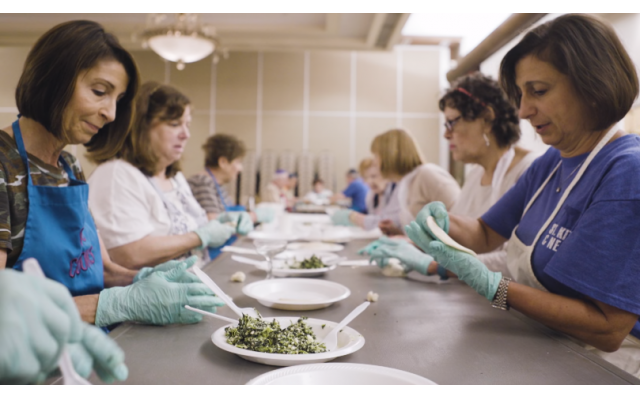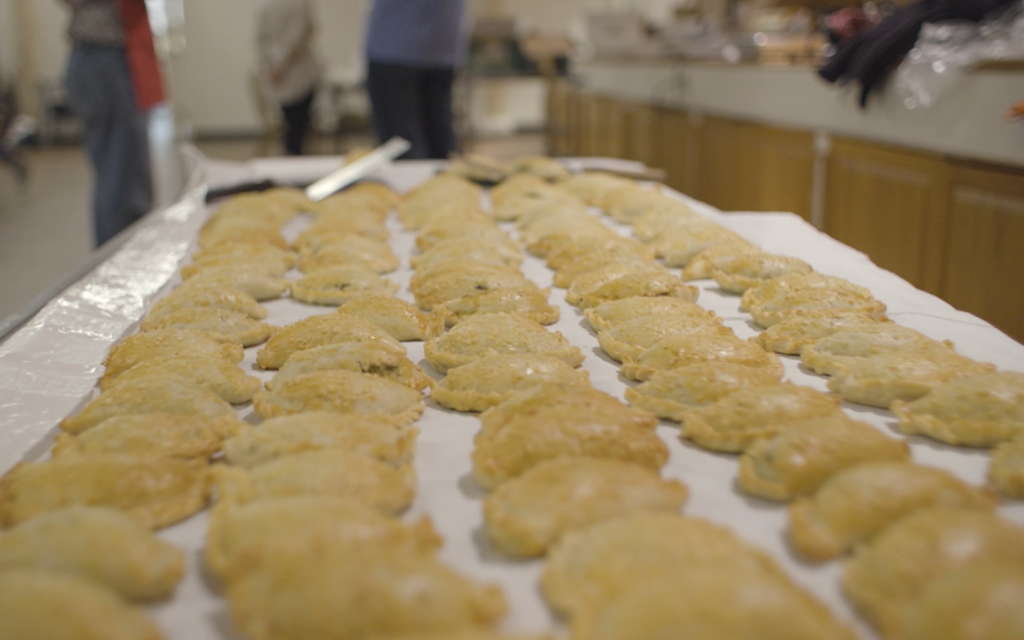The Bureka Ladies of Or VeShalom Maintain Tradition
Famed anthropologist Ruth Behar stopped by Congregation Or VeShalom and was gifted six frozen bureka pastries.

Famed anthropologist Ruth Behar stopped by Congregation Or VeShalom, the Sephardic synagogue on North Druid Hills Road, the day after delivering Emory’s annual Tenenbaum Lecture on Jewish life. The congregation’s gift to her was a modest one: six frozen bureka pastries nestled on a white foam plastic plate tied with a thin blue ribbon.
The presentation speech by Grace Benator, who was born into the congregation 83 years ago, was short and simple: “Don’t microwave. Just heat in a 400-degree oven. They’ll get nice and crispy.”
For the past several decades, the little pillows of dough filled with savory fillings such as feta cheese and spinach, or eggplant, or cheese and rice, have been a standout at the synagogue’s annual Chanukah bazaar. They are said to have originated as a Sabbath treat in the eastern Mediterranean. Last year, Or VeShalom sold more than 10,000 of the pastries, which helped to raise more than $50,000.
For decades, they have, in effect, become a symbol of the way the congregation has honored its heritage. The synagogue was started 104 years ago by immigrants from Turkey and the island of Rhodes off the Greek coast. Every Tuesday morning the members of the Sisterhood sit at a long stainless steel table shaping and folding ovals of fresh dough just as their grandmothers and great-grandmothers did in the “old country.”
Last November, The New York Times was impressed enough by the tradition that it sent Jewish cooking maven Joan Nathan to write about “Bureka Tuesdays” at Or VeShalom.
Just last Sunday, the Atlanta Jewish Film Festival premiered “Tuesdays Are for Burekas,” a six-minute tribute by Atlanta marketer Adam Hirsch. He’s been cited by the Atlanta Jewish Times as one of its 40 Under 40 outstanding young community leaders. He believes that what the women of Or VeShalom are doing is unique.
“Second- and third-generation Americans have kind of lost all of their family traditions, especially culinary traditions, and have just taken in American culture. I feel that, for these women, it’s really an important thing that they teach their children and their grandchildren these recipes.”
It’s a job that becomes increasingly critical as the Sephardic community, which was once tightly bound by marriage and family, becomes more assimilated. Or VeShalom, which recently renovated its intimate jewel box of a synagogue, has no Sunday school or Hebrew school, and is said to have had a difficult time attracting new members – Sephardic or not.

Behar, who was born in Cuba before Castro came to power, and moved to America as a small child, grew up in a half Sephardic family in Queens, New York. After a distinguished career studying the modern Hispanic populations of Mexico and Cuba, she has developed a strong interest in her Sephardic roots.
“I was really interested in the bureka ladies. I am interested in this culture and what remains of it in America and in the world. I am interested in what’s happened to the Sephardim, to Ladino, their ancient language, what is distinct about these people today. It is a more invisible culture than the Ashkenazic majority.”
Hirsch has also taken an interest in Sephardic culture, partly because some of his relatives by marriage are Sephardic and partly because he is involved in Hispanic culture through the Goza Tequila brand he helped create.
In additional to the screening this year, two other short films he’s made have been featured in past AJFF programs. He’s now putting the finishing touches on a longer documentary of Ethiopian Jews in Israel that he hopes to debut though the AJFF.
He’s particularly impressed by the way the AJFF, which just concluded, brings so many different people together.
“Every time I am a part of it, I look around the room and I am really impressed by the diversity in the room. It really makes me happy knowing that people from different cultures show up to Atlanta Jewish Film Festival because they care about the Jewish community that they live in.”
Before she left Or VeShalom, Behar, with her burekas firmly in hand, presented the synagogue a copy of her award-winning coming of age novel for middle schoolers, “Lucky Broken Girl.” It is about a young girl, like herself, growing up Sephardic. Next up is a book for even younger readers.
“I want to come to terms with Sephardic life as a poet and as a writer and what it means to be half Sephardic. I am now writing a children’s book about Sephardic culture,” she revealed, “because we have hardly any books about that for 5-year-olds.”



comments